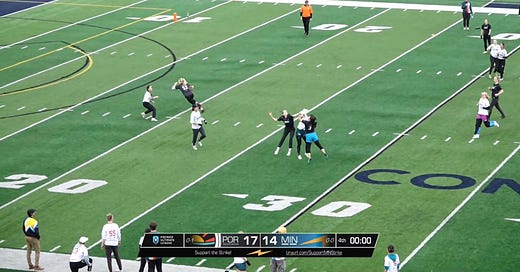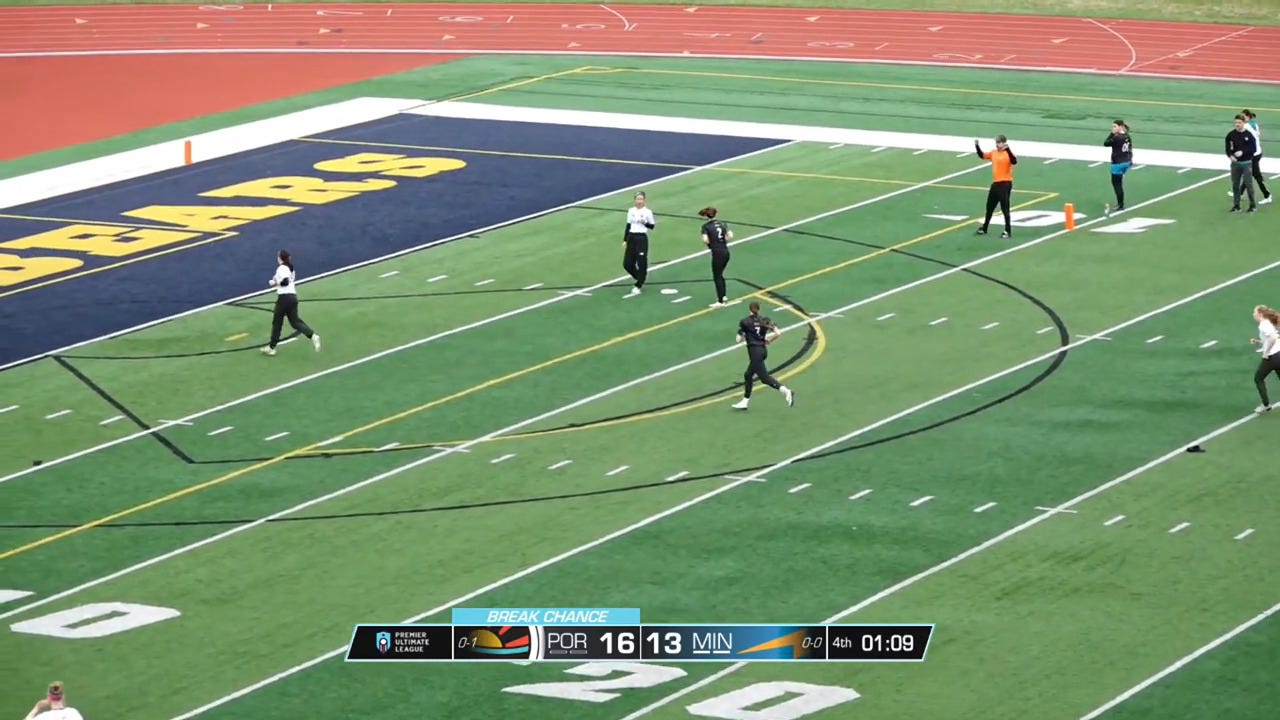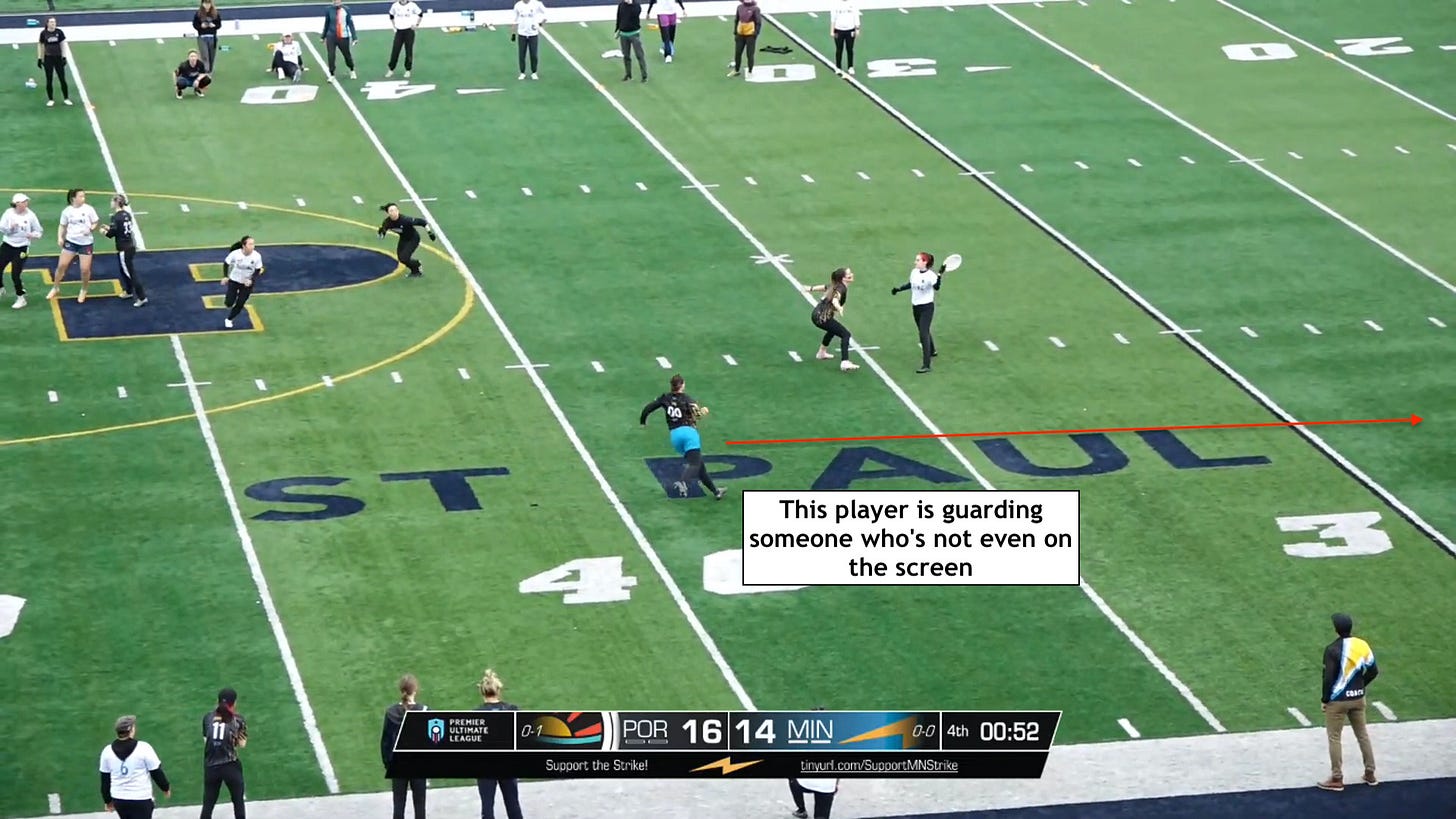The PUL's end-of-game strategic awareness remains disappointing
Play like you're trying to win the game
I really want to see the PUL succeed.
That said, I believe in the Brene Brown-esque school of thought that we grow stronger by having honest discussions about the areas where things could be better. To improve, we have to be able to admit we're not already perfect. In The Culture Code, it's said of NBA coach Gregg Popovich that he'll "tell you the truth, with no bullshit, and then he’ll love you to death."
In other words: what I'll say below is not intended to bring anyone down, but to spur them to reach the high standards I know they're capable of achieving.
Which brings us to today's topic: the PUL is still very bad at handling end-of-game strategic decisions.
Let's break down the last 100 or so seconds of this past weekend's game between Portland Rising and Minnesota Strike:
Minnesota, down 3, wastes time setting up their offense
With 85 seconds left, Minnesota is losing by 3, 16-13, and they just threw a turnover, giving Portland the disc on Portland's own goal line.
Minnesota generates a turnover on the first pass, giving new life to their comeback hopes. The disc lands in the endzone with 71 seconds left on the clock.
And then...it takes 14 seconds for Minnesota to pick up the disc and get it back to the goal line! They waste 20% of the remaining time in the game just picking the disc up.
I know I like fast breaks more than most people, but there's never been a better time to fast break than on this turnover. The arrangement of players on this field looked like the image below and it still took them more than ten seconds to put the disc in play (note the disc within arm's reach of a Minnesota player):
If you're trying to win, you need to score quickly! Pick up the disc and score!
Portland, up 2, takes unnecessary risks
So Minnesota scores, and pulls to Portland with 55 seconds on the clock.
Portland then proceeds to...play completely normal offense!?
I can't really complain too much here, because Portland manages to avoid any turnovers and scores with just a few seconds remaining. But...why are they taking these risks?
Their first throw after centering the pull is a high release throw that breaks the mark—the receiver has to jump and fully extends to catch it. Had that throw gone two inches higher, Minnesota would have suddenly had a very real chance to win the game.
Make them stop your easy throws before throwing something harder! Playing devil's advocate on myself: yes, this player successfully used the same throw a bunch this game. It's still much more risky than a wide open dump pass. They could've thrown that dump to the player that caught the pull, who didn't have a defender within 10+ yards of them. Instead they threw the disc right past the poaching defender:
Again, I'm happy for Portland that it worked out, but their decision to play completely normal offense makes me shake my head.
I'm not saying they shouldn't move the disc down the field! But with 50 seconds left, they should at least force the defense to challenge their dump throws before they start looking to break the mark.
By analogy, consider what happens in American football: yes, teams who are trying to "kill clock" will sometimes pass the ball instead of running. But they only do this when the opposing defense has committed more players to stop a running play. Frisbee teams should do the same—at least force the defense to (kinda, sorta) commit to stopping you from going backwards before you make risky passes going forwards.
Portland made a similar play while winning by two with 2 and a half minutes left. Just after the announcer finished saying Portland will "be pretty content to just play catch here", a Portland player ignores a wide open dump pass to throw a long inside forehand that sails high.
Luckily, another Portland receiver is there and a turnover is avoided. But Portland won this game by getting a little lucky with these throws. They could have won it without needing any luck if they had thrown the wide-open passes instead of taking unnecessary risks.
Minnesota and Portland engage in the world's most pointless jump ball
After Portland scores with 11 seconds left to go back up by three, 17-14, the game is pretty much over. Portland pulls to Minnesota who is unable to generate an immediate attempt towards the endzone.
Before getting to the final buzzer, let's briefly talk about the start of this point:
For Portland: why are you playing defense on the dump cutter with 5 seconds left? At this point in the game, any backwards pass is GREAT for you. There are pretty much only two things you should be doing: One, making it hard for them to throw hucks, and two, defending hucks. Stand in the passing lane and let them dump it!
Honestly, the Portland players shouldn't even run down to cover the pull. Make Minnesota come to you! They're not scoring three times in 11 seconds anyway.
For Minnesota: the only way you can win is to score IMMEDIATELY. That means you should have players sprinting to the opposite endzone in anticipation of an immediate huck. It seems like one player sort of does this, but most of the Minnesota offense is doing their usual thing.
And—if you're still trying to win—you should put that huck up with 10 seconds left, even if it's not a great option. In a vacuum, it's "bad frisbee", but in this context it's the only chance remaining for you to possibly win.
Really, these bullet points are minor quibbles—it's pretty much physically impossible to come back from three points down with 11 seconds left, so what the teams did here doesn't matter that much.
But let's talk about the final moment of the game. Just before the clock hits zero, Minnesota puts the disc up in the air, a floaty throw that lands 15 yards from the endzone, AND THREE PLAYERS ENGAGE IN A JUMP BALL FOR IT!
Why risk injury catching a jump ball when it's literally impossible for it to affect the outcome of the game? No matter what happens on this throw, Portland has won.
I often hear frisbee players worry about the dangerous plays in our sport, but at least in the heat of an intense game it's understandable when players go hard. Risking injury like this for a meaningless jump ball is just silly—all downside, no upside.
Adding to the zaniness, one of the players involved in this catch even makes some sort of call. Which, again, cannot possibly affect the outcome of the game. At least they have the presence of mind to say "oh well" and retract the call when they see the game has officially ended.
I think this play is especially frustrating in the context of Minnesota's failure to pick up the disc quickly a minute earlier—when they still had a chance, they acted like they weren't even trying to win, and then once the game is out of reach, they attack hard for a meaningless catch.
Timed frisbee has only been around for a few years, but the end-of-game strategies seen in other sports are pretty easy to apply to frisbee:
If you're losing and on offense, score quickly. Treat every second like it's precious.
If you're losing and on defense, press hard for turnovers, even if that requires making other opportunities more available to the offense (an endgame situation like this is one of the very few situations where I advocate for playing full-ball-denial, "force them deep" defense).
If you're winning and on offense, waste time if they let you. Force them to stop you from wasting time before you take risks—the changes they make to force you to stop wasting time will make all your other options more open.
If you're winning and on defense, force them to spend a lot of time to score.
Yes, the rules of frisbee forbid time-wasting in certain situations, but I don't think anyone can say that "throwing an open dump pass" is ever bad spirit. Portland could've killed more time before picking up the disc after the Minnesota turnover that begins this article. But I don't criticize them for it because it would have been illegal gamesmanship.
I watch a lot of PUL games and I want to see them become even more entertaining. Smarter end-of-game strategy is one of the areas where I'm looking forward to seeing teams improve in future years.




